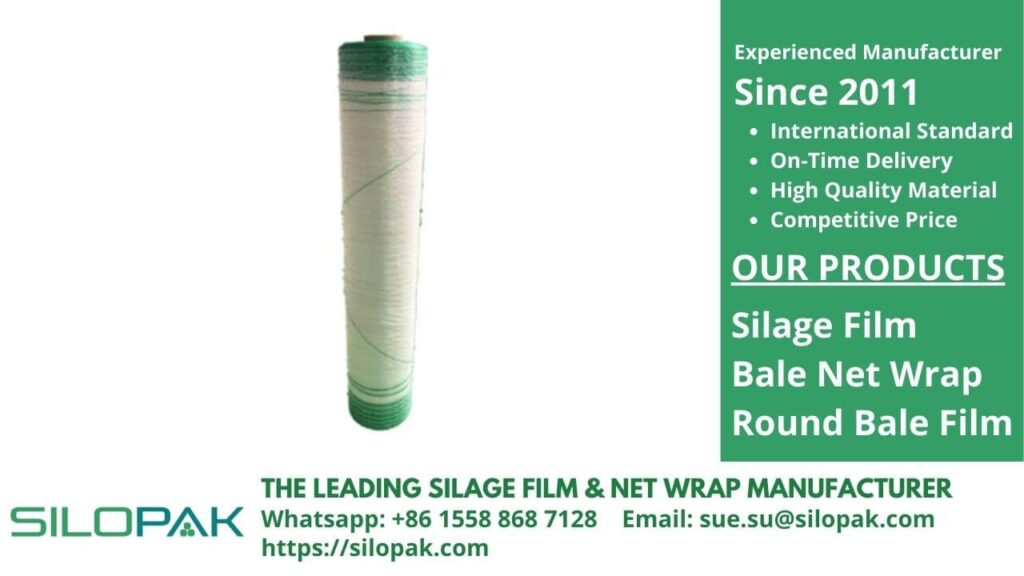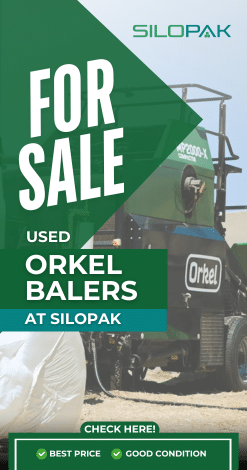Net Wrap in New Zealand: A New Agricultural Trend on the Rise

Why do so many farmers make the switch to net wrap in New Zealand? There is a growing trend in the country that a great number of farmers are using net wrap to cover their grasses and forages of high moisture after baling. Find out why after the jump.
contents
What Makes Net-wrapping High-moisture Bales Popular
The popularity of net wrap in New Zealand rises along with the practice of covering high-moisture hay, and this can be attributed to several key important reasons:
- Baling high moisture hay comes with extra costs, but these can be offset easily by reduced loss of hay in harvesting, storing, and handling stages. On the contrary, dry bales that are left out in the open lead to 20-30% losses within eight months.
- The quality of forage is at its highest right after cutting. Wrapping bales of high moisture levels at this stage means you can feed your cattle with feedstuffs that are of the best quality and the highest protein value.
- The animals can’t help but love high-moisture bales. Hay losses increase by 10-20% from the refusal rate by cows given dry hay.
- Baling high-moisture forage with net wrap in New Zealand allows for early harvest and makes it possible for you to avoid the damaging effects of rainfall.
- For dairy and beef producers, covering bales of high moisture with a net wrap is a beneficial alternative to take during a period of high humidity or wet seasons. This is crucial to take into account as today’s weather patterns are highly unpredictable.
- Wrapping bales only cost you half of what it takes to procure precision choppers, machinery such as wagons, and other storage facilities that are known to be expensive. It will be a good solution ultimately if you are starting from scratch.
Concerns and Suggestions
The biggest budgetary concern for you opting to cover your high moisture bales with net wrap in New Zealand would be a baler. More specifically, you will need a baler that comes with precutting knife system, heavy-duty tines, and a robust pickup assembly. Why? It’s because you are going to handle substances and matters that are of high moisture levels. Choosing the right machine directly affects the feeding experience and overall performance as well as improves the palatability of the feed itself.
The next concern to think about would be the price of the net wrap in New Zealand. One thing to keep in mind when it comes to this subject is that plastic wrappers that are of higher production group cost more than other variants. Pay attention to this to stop costs and expenses from bloating.
Recommended moisture level range would be 45 to 55%. Within the range, the hay would stay in its best conditions. If you choose to wrap the high moisture hay with net wrap, know that different levels of moisture call for different techniques and handling methods.
- 55-65% moisture: Accommodative of fermentation but may yield a wet layer and rank outside the bale.
- 35-45% moisture: Fermentation is still observable if minimal, but it calls for more wrapping. The bales remain viable for up to a year later. Working with this range of moisture levels, it’s more about keeping oxygen out than promoting fermentation.
- Below 35% moisture: Fermentation is practically unobservable. Extra layers of wrapping are required.
Some Helpful Tips
Below are some tips that might be helpful for you in using net wrap in New Zealand:
- Try to wrap the high moisture bales as soon as you’re done baling. At the very least, try to do it within 24 hours after the baling process completes.
- Net wrap is good at keeping the surface of the bales smooth without stems poking out.
- As for the material, go for a net wrap product that is 1 millimeter thick and made of polyethylene film of low density.
- Stretch the wrap-in prior by 55 to 75 percent—excessive stretch results in oxygen and CO2 passing into and out of the bales. Under-stretching, on the other hand, leads to improper sealing as the plastic doesn’t cling to the material thoroughly.
- Inspect damage periodically. Repair accordingly if you discover any damage.
- Don’t handle the wrapped bales after 12 hours. The wrap may break from squeezing.
- For quality net wrap in New Zealand, look no further than Silopak. We provide durable wraps that are both tear and wear-resistant.

